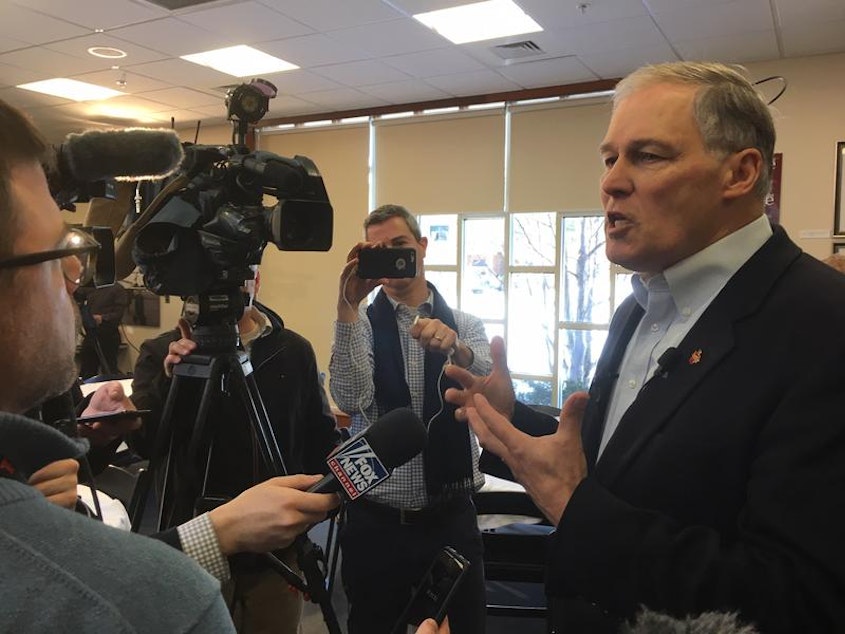Inslee unveils aggressive plan to cut the nation's greenhouse gas emissions in half by 2030

Campaigning for president in California on Friday, Washington's Gov. Jay Inslee, a Democrat, is expected to call for all new cars and new buildings to be carbon-free by 2030 and all electricity to go carbon-free by 2035.
Inslee's announcement, planned for a 9:30 a.m. press event in Los Angeles, marks his first concrete policy idea since launching his campaign two months ago on a platform of combating climate change.
According to an eight-page briefing document, Inslee's "100% Clean Energy for America Plan," the first part of which he was scheduled to unveil on Friday, would put the United States on a path to cut its greenhouse gas emissions in half by 2030. That's a target the Intergovermental Panel on Climate Change (IPCC) has said is necessary to avert the most dire consequences of global warming.
The plan said if Inslee is elected president he would issue an executive order on his first day in office requiring all new residential and commerical buildings emit zero carbon emissions by 2030. In addition, the executive order would establish a 100% clean electricity standard requiring carbon-neutral power by 2030 and zero emission by 2035.
"We cannot tackle the existential threat of climate change by merely addressing climate pollution from one sector of our economy," said the briefing document.
The plan notes that vehicles, buildings and electricity account for 70% of the country's carbon emissions. By pursusing a 100% clean energy agenda for the nation, Inslee said he would build on clean electricity measures that have already been adopted in states like California, New Mexico and, just recently, Washington. Those states have all adopted 2045 as the target date for carbon-free electricity.
Sponsored
To achieve the goal, Inslee's plan would implement a ban on coal power beginning in 2025 and require the shuttering all coal-fired power plants by 2030. According to the U.S. Energy Information Administration, electric utilities operated 219 coal-fired plants across the country in 2017. To soften the blow of closing plants, Inslee's plan calls for "major investments" to help workers transition into other jobs.
Details on that transition were not included. However, the plan projects that "millions of good-paying jobs" would be created during America's transition to clean energy.
"We can put millions of Americans to work building new energy solutions, sustainable infrastructure, and pollution-free communities," the plan said.
Critics of climate action often warn that a shift to low-carbon or carbon-free energy sources will drive up costs for consumers. Even supporters of clean energy, like the Union of Concerned Scientists, acknowledge that upfront capital costs can be a barrier, even if the cost of clean energy is lower over the lifetime of a project.
Inslee insists taxpayers are already paying the price of climate change and that clean energy will be a money-saver.
Sponsored
"Transitioning to 100% clean vehicles, buildings and electricity will free Americans from the stranglehold of rising gas prices and provide permanent savings on heating their homes," Inslee's plan read.
Included in the plan is a proposal for refundable tax incentives to encourage clean energy investments. According to the briefing document, much of the plan could be implemented through executive action and under existing laws like the Clean Air Act, but other elements of the plan would require congressional approval.
Here are more of the plan's specifics:
- To achieve the transition to clean energy in a decade, Inslee's plan envisions using federal lands and offshore waters to deploy renewable energy facilities. The proposal also calls for guaranteed loans and direct grants to spur development, as well as streamlined permitting for siting and transmission lines.
- The plan additionally calls for a clean fuels standard, a policy that failed to pass the Washington Legislature this year, despite Inslee's backing. Strong opposition came from the Western States Petroleum Association, which claimed that the biofuels industry isn't mature enough yet to meet the requirements for blending less carbon-intensive fuels into gasoline and diesel. Both Oregon and California already have low-carbon fuel standards on the books.
- To incentivize the purchase of electric vehicles, Inslee would extend and expand the Electric Vehicle Tax Credit and create a new "Clean Cars for Clunkers" program to encourage people to trade-in their older vehicles for a new zero-emissions car. Inslee would also pursue a "massive" effort to deploy charging stations across the nation for battery-powered vehicles and incentivize local governments buy zero-emission buses.
- To achieve the zero-emission building goal, Inslee would create a "Zero-Carbon Building Standard" by 2023 and establish new incentives for both homeowners and commercial builders, as well as other policies. This goal would also require buy-in from state and local governments to adopt new and more stringent building codes.
Inslee's unveiling of the first plank of his climate agenda comes the same week former Texas Congressman Beto O'Rourke, who's also running for president, released a $5 trillion climate change plan. Inslee quickly criticized O'Rourke for his record on climate change policy while in Congress.
Sponsored
The rollout from Inslee also comes on the heels of a state legislative session that delivered him several wins on his climate agenda. In addition to passage of the clean electricity mandate, lawmakers passed bills addressing carbon emissions from buildings, incentivizing electric vehicles and instituting new restrictions on hydrofluorcarbons, otherwise known as "super pollutants."
Inslee plans to unveil other elements of his climate plan in the coming weeks, including policies to address the issue of environmental justice and to roll back tax policies that favor the fossil fuel industry. The Inslee campaign did not provide an estimated price tag for its proposal.




